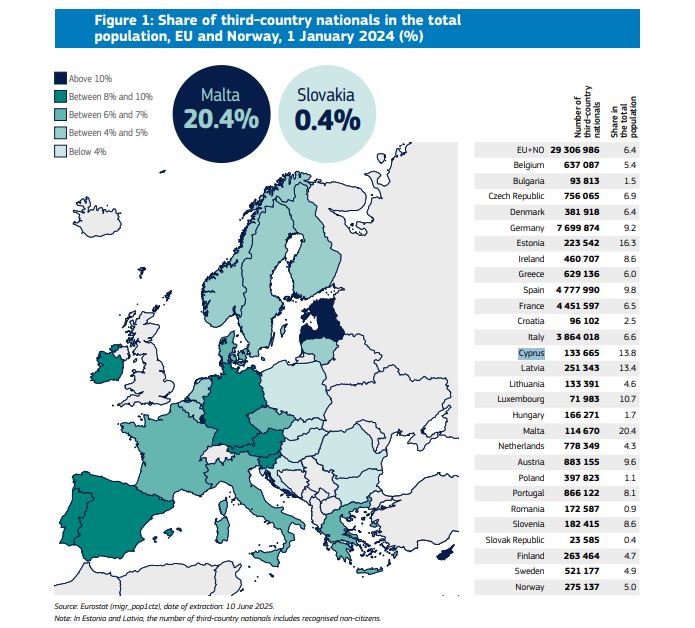The number of asylum applications in Cyprus have plummeted to 6,750 in 2024, compared to 11,660 in 2023, marking a staggering 42 per cent decline, according to the annual Asylum and Migration Overview of the European Migration Network (EMN).
In its most recent overview, the EMN reports that at 13.8 per cent Cyprus had the third-highest share of third-country nationals in the total population in 2024, following Malta, at 20.4 per cent, and Estonia, at 16.3 per cent.
The overview underscored the significance of the new act on migration and asylum, set to create “a more coordinated and unified framework for managing migration across the EU”, with implementation starting in June 2026.
Overall, asylum applications in the EU fell by 13 percent in 2024 compared to the previous year, marking the first decline in recent years.
The overview emphasised that in 2024, important legal reforms to strengthen migrant workers’ rights and combat labour exploitation were introduced by EU member states.
In this context, the EMN mentioned Cyprus’ signing of a cooperation memorandum between the labour inspectorate and the police’s office on human exploitation as part of significant efforts in this direction.
According to the overview a total of 13 ENM countries, including Cyprus, drove efforts to tighten their asylum systems and “increase administrative efficiency, while continuing to meet humanitarian obligations”, with Cyprus moving asylum responsibilities from the Interior Ministry to the new Deputy Ministry of Migration.

In line with broader EU efforts, Cyprus is reported of having introduced further measures to expand reception capacity, reduce waiting times, and improve facility management for international protection applicants.
Additionally, Cyprus is reported to have significantly enhanced its reception infrastructure for international protection applicants with the planned construction of a new reception centre in Limnes, set to feature 1,000 beds and be completed by the end of 2025, according to a statement of Transport Minister Alexis Vafeades in February.
Furthermore, the overview mentions the Kofinou reception centre, which had first started its operations in 2014 and had in the past been referred to as a ‘model reception centre’ for migrants after having undergone notable upgrades.
“These developments reflect Cyprus’s commitment to improving reception conditions and managing migration more effectively”, the overview read.
Overall, the overview finds that in 2024, a significant shift towards more restrictive migration and asylum policies in 17 EMN countries, including stricter measures regarding legal migration, asylum, integration, and citizenship acquisition.
These developments, the overview says, national security concerns, concerns about the misuse of migration channels, pressure on asylum and reception systems, housing shortages, and integration challenges.






Click here to change your cookie preferences